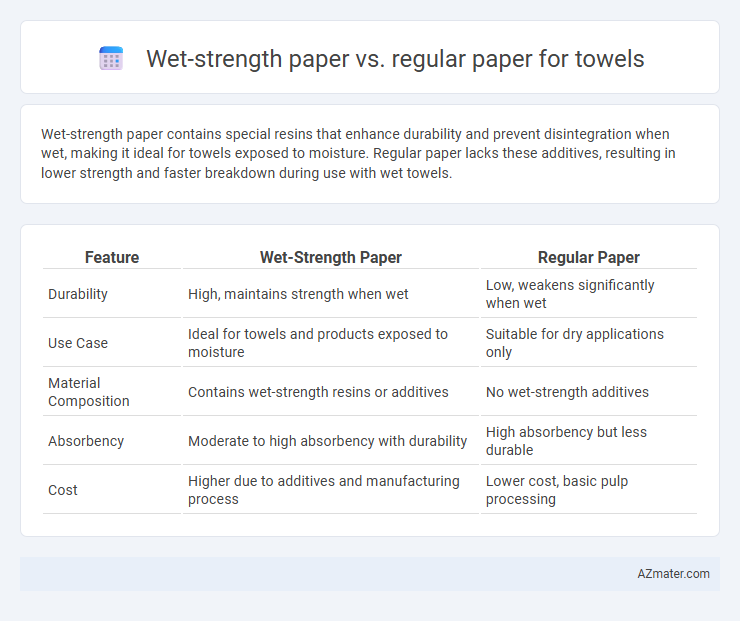Wet-strength paper contains special resins that enhance durability and prevent disintegration when wet, making it ideal for towels exposed to moisture. Regular paper lacks these additives, resulting in lower strength and faster breakdown during use with wet towels.
Table of Comparison
| Feature | Wet-Strength Paper | Regular Paper |
|---|---|---|
| Durability | High, maintains strength when wet | Low, weakens significantly when wet |
| Use Case | Ideal for towels and products exposed to moisture | Suitable for dry applications only |
| Material Composition | Contains wet-strength resins or additives | No wet-strength additives |
| Absorbency | Moderate to high absorbency with durability | High absorbency but less durable |
| Cost | Higher due to additives and manufacturing process | Lower cost, basic pulp processing |
Introduction to Wet-Strength and Regular Paper Towels
Wet-strength paper towels are engineered with specialized resins to maintain durability and integrity when exposed to moisture, making them ideal for tasks requiring robust absorption without disintegration. Regular paper towels, typically made from cellulose fibers without chemical enhancements, offer effective absorbency for light spills but tend to weaken and tear when wet. The wet-strength properties of enhanced paper towels improve performance in kitchens, laboratories, and industrial settings where durability in moist conditions is essential.
What Is Wet-Strength Paper?
Wet-strength paper is specially treated with chemical additives to maintain its tensile strength and durability when exposed to moisture, making it ideal for towels used in damp or wet conditions. Unlike regular paper, which quickly loses integrity and tears when wet, wet-strength paper resists disintegration, enabling effective absorption and durability in environments such as kitchens, bathrooms, and industrial settings. This enhanced resistance is achieved through resins like polyamide-epichlorohydrin that bond fibers more securely to withstand water exposure.
Composition of Regular Paper Towels
Regular paper towels primarily consist of cellulose fibers derived from wood pulp, which provide absorbency but lack durability when wet. Unlike wet-strength paper towels, they do not contain synthetic resins or wet-strength additives such as polyamide-epichlorohydrin, causing them to weaken and disintegrate upon prolonged exposure to moisture. The absence of these reinforcing compounds results in lower tensile strength and faster breakdown during cleaning tasks involving liquids.
Manufacturing Process Differences
Wet-strength paper for towels undergoes a specialized manufacturing process involving the addition of wet-strength resins, such as polyamide-epichlorohydrin, during the wet-end stage to enhance fiber bonding and resistance to disintegration when exposed to moisture. Regular paper, by contrast, employs conventional papermaking techniques without wet-strength additives, resulting in lower durability and tensile strength when saturated. The curing process for wet-strength paper often includes specific drying and chemical bonding phases that stabilize the resin, ensuring the towel maintains structural integrity during use.
Absorbency: Wet-Strength vs Regular Paper
Wet-strength paper features enhanced fiber bonding through chemical additives, significantly increasing its absorption capacity and durability when exposed to moisture, making it ideal for towel applications requiring prolonged wet use. Regular paper lacks these reinforcements, causing it to disintegrate or lose integrity quickly upon absorbing liquids, resulting in lower absorbency efficiency. The superior wet-strength property ensures towels maintain structural integrity and effective moisture retention compared to standard paper products.
Durability and Tear Resistance Compared
Wet-strength paper towels contain chemical additives like polyamide-epichlorohydrin that enhance fiber bonding, resulting in significantly higher durability and tear resistance compared to regular paper towels. Regular paper towels tend to weaken and tear easily when wet due to their lack of reinforced fiber structure. This makes wet-strength paper ideal for tasks involving moisture exposure, as it maintains integrity and resists disintegration better than standard paper towels.
Environmental Impact and Biodegradability
Wet-strength paper for towels incorporates resins that enhance durability and resistance to moisture, but these additives can hinder biodegradability and increase environmental impact due to slower breakdown in landfills. Regular paper towels, lacking synthetic wet-strength resins, degrade faster and are generally more eco-friendly, reducing long-term pollution and facilitating composting. Selecting towels with biodegradable fibers and minimal chemical treatments supports sustainability by promoting natural decomposition and lowering landfill accumulation.
Cost Considerations for Consumers and Manufacturers
Wet-strength paper towels, designed with additives like wet-strength resins, cost more to produce due to enhanced durability and chemical treatments compared to regular paper towels. Consumers often face higher prices for wet-strength towels, justified by longer-lasting performance and reduced usage, though budget-sensitive buyers may prefer regular paper for basic needs. Manufacturers encounter increased raw material and processing expenses when producing wet-strength paper, impacting pricing strategies and profit margins in competitive markets.
Ideal Applications for Wet-Strength Paper Towels
Wet-strength paper towels exhibit enhanced durability and resistance to tearing when wet, making them ideal for heavy-duty cleaning tasks in kitchens, hospitals, and industrial settings. These towels maintain structural integrity during repeated scrubbing and absorb moisture efficiently, outperforming regular paper towels in environments prone to spills and contamination. Their superior wet-resistance makes them essential for food service areas, medical facilities, and automotive workshops where hygiene and performance are critical.
Choosing the Right Paper Towel for Your Needs
Wet-strength paper towels feature enhanced durability and resistance to tearing when wet, making them ideal for heavy-duty cleaning and spills. Regular paper towels typically excel in lightweight tasks and quick absorption but may disintegrate faster under moisture. Selecting the right paper towel depends on your specific application, balancing strength and absorbency to match kitchen messes or commercial cleaning requirements.

Infographic: Wet-strength paper vs Regular paper for Towel
 azmater.com
azmater.com